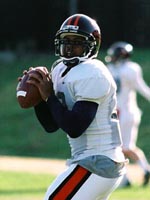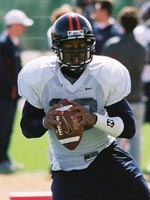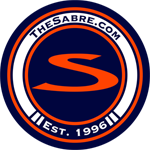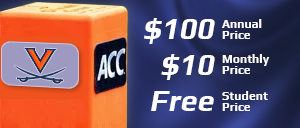 Marques Hagans |
University of Virginia football players Marques Hagans and Brandon Lee have been found not guilty of engaging in disorderly conduct after former teammate Jamaine Winborne was shot during an end of school party.
Hagans, a rising junior and the most likely candidate to start at quarterback for the Cavaliers next season, and Lee, a rising sophomore and reserve cornerback, were each facing up to a year in jail and a fine of $2,500 if found guilty.
During the players’ trial Tuesday morning in Albemarle County General District Court, Lieutenant Vincent Jones of the University of Virginia Police Department, the only witness for the Commonwealth, testified that he responded to Faulkner Apartments at approximately 12:55 a.m. on April 28, 2004, following a report that someone had been shot.
Upon arrival, Jones discovered the shooting victim was Winborne, a three-year starter at defensive back for the Cavaliers. He went on to describe the scene of the shooting as “chaotic” with “people all over the area.” The officers also discovered several groups of individuals congregated in the courtyard outside the dorm room of the suspected shooter. At the time, the whereabouts of the shooter were unknown.
Jones and his fellow officers entered the dorm room of the suspected shooter and found that the residence was empty. When he left the residence, Jones testified that he attempted to “restore order.” Jones testified that he explained to the individuals still outside the shooter’s residence that he was “securing the area” and advised that the shooter had not been apprehended. It was at this point that he encountered Hagans and Lee, who were part of one of the groups in the courtyard.
Jones testified that he advised Hagans to leave the scene “numerous times.” Hagans, who Jones testified was visibly “upset” over the fact that his teammate had been shot, appeared to have been drinking. Jones testified that Hagans had an odor of an alcoholic beverage coming from his person and that Hagans was cursing and gesturing with his arms. Significantly, Hagans did not direct any of his language or his conduct at Jones or anyone else at the scene. Jones could not recall exactly what curse words Hagans had used and did not conduct any field sobriety tests to determine whether Hagans was actually intoxicated.
Hagans did not have any alcohol in his possession at the time of his encounter with Jones. Despite being told four times to leave the scene of the shooting, Hagans remained and Jones made the decision to arrest him for disorderly conduct. Once Jones began to arrest Hagans, Jones testified that Hagans still did not curse the officer or resist the arrest.
 Hagans was cursing and gesturing, an officer testified. |
As Hagans was being arrested, Lee attempted to intercede on behalf of his teammate, going so far as to step between Hagans and Jones. Jones testified that Lee physically made contact with him and with Hagans while Jones was trying to handcuff Hagans. According to Jones’ testimony, Lee kept offering to take Hagans with him and away from the scene. Jones testified that he asked Lee to refrain from interfering in the arrest, but that Lee persisted. Once Jones completed Hagans’ arrest, he then placed Lee under arrest for disorderly conduct. On cross examination, Jones admitted that Lee did not curse and did not appear to have been drinking. He also admitted that Lee was not behaving like Hagans was behaving prior to Hagans’ arrest. Jones also admitted that Lee kept asking Jones why Hagans was being arrested so that he could “tell his coach.”
Ned Michie, the attorney for Hagans, and Vanessa Hicks, the attorney for Lee, both made oral motions to strike at the conclusion of the Commonwealth’s evidence. A motion to strike is a request by a defendant for a judge to dismiss a case on the basis that the evidence put forth by the Commonwealth is insufficient to prove the charge even after viewing the evidence as favorably as possible for the Commonwealth. Michie argued that Hagans was required by statute and by judicial precedent to direct his conduct at a particular person. Hicks argued that Lee’s actions were not accompanied by the requisite intent to justify his conviction.
Judge Robert H. Downer, Jr. agreed and granted both motions to strike. In the midst of explaining his decision to dismiss the charges, Downer took the opportunity to praise Lieutenant Jones’ approach to the situation, stating that Jones’ conduct was “above reproach”, and to chastise Hagans and Lee, noting that Jones was acting in part to ensure their safety. Incidentally, Jones is an African-American officer.
While the legal conclusion of the trial was relatively pedestrian, some minor drama ensued just prior to the hearing when it appeared that Ron Tweel, an attorney with the law firm of Michie, Hamlett, Lowry, and Tweel in Charlottesville, would replace Michie before the trial. Tweel, who has represented Muhammad Ali, briefly appeared and indicated that he had been contacted over the Memorial Day weekend about possibly representing Hagans in the case. When the case was called for trial, both Michie and Tweel approached the bench with Hagans, but Michie was the only attorney to cross examine Jones and argue the motion to strike.
Michie commented after the trial that he was “pleased that the judge saw the conduct that took place was not a violation of the disorderly conduct law.” He went on to point out that “there is no question that the officer was doing exactly what he should have done” and that “Mr. Hagans is very respectful of police officers and respects the work that the officers do.” According to Michie, Hagans “was just very upset at the time because of his friend and teammate being shot.”
In related cases, a property destruction charge arising out of this same incident against Kenneth Tynes, another UVa football player, was dismissed in May. Also in May, the malicious wounding charge against Aaron Joshua Robinson, the individual suspected of shooting Winborne, was certified to a grand jury.
Robert (“Rob”) R. Hagy, II is a 1993 graduate of the University of Virginia and an attorney who lives in Charlottesville. He is the author of the Sports and the Law Report, a web blog dedicated to following legal developments in the sports world.



